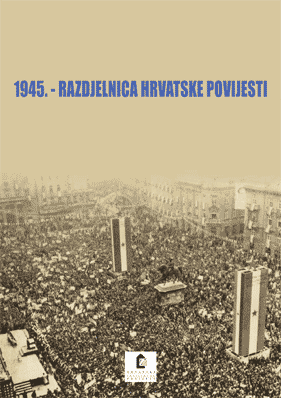Politički procesi u Hrvatskoj neposredno nakon Drugoga svjetskog rata
Political Trials in Croatia Immediately after the Second World War
Author(s): Nada Kisić Kolanović
Subject(s): Politics / Political Sciences, Politics, History, Law, Constitution, Jurisprudence, History of Law, Political history, Recent History (1900 till today), Special Historiographies:, WW II and following years (1940 - 1949), Post-War period (1950 - 1989), History of Communism, Historical revisionism, Fascism, Nazism and WW II
Published by: Hrvatski institut za povijest
Summary/Abstract: Political and cultural changes in Croatia immediately after the conclusion of the Second World War in 1945 and the early years of communist rule created a new historical reality which transformed the basis of the legal system. The concept of ≪rights≫ and ≪justice≫ in this system did not primarily rest on ≪normative≫ categories, rather on ≪political≫ ones. At the same time, the concept of socialist legality≫ enabled the courts to ≪creatively≫ change laws.
Along with this, the very concept of criminal activities was based on ≪material, rather than ≪normative≫ concepts which demanded a precise description of the act in law that led to many infractions in judicial practice at the expense of the rights of the accused. From 1945 to 1950, the first period of the communist Yugoslavian state, although the legal system was not defecient in laws, during this 5 year span the National Assembly of the Federated People’s Republics of Yugoslavia (FNRJ) enacted more than 200 basic laws. A new criminal code was introduced in 1951 which in the domain of criminal law was codified on a relatively modern expert basis. Nevertheless, it is important to point out that courts were not tied to legal norms, that is ≪to the letter of the law≫, but to the ≪notion and spirit of socialist law≫. When dealing with the concept of ≪socialist legality≫ we necessarily encounter the political trials which were carried out of leaders of the defeated Independent State of Croatia, Church dignitaries and ideological opponents of communism who belonged to the bourgeois political parties. Historical documentation supports the conclusion that these trials enabled the communist government to carry out a specific type of ideological violence. In political trials the judiciary was put in a situation where it negated formal legalities, and because of this the Yugoslav concept of punishing ≪war crimes≫ at the time received international criticism. Thus a large number of extradition demands of Yugoslavian citizens were disputed because the regime was suspected of using charges of war crimes to settle political scores.
Book: 1945. - Razdjelnica hrvatske povijesti
- Page Range: 75-96
- Page Count: 22
- Publication Year: 2005
- Language: Croatian
- Content File-PDF

